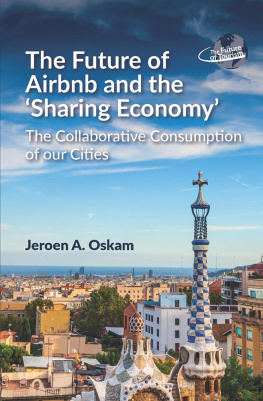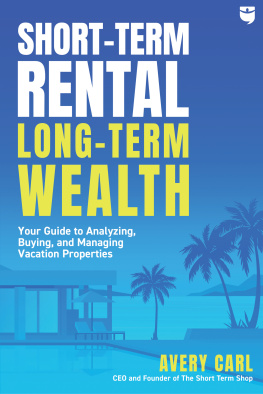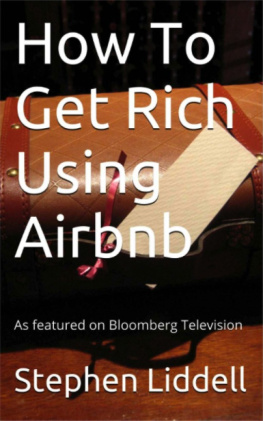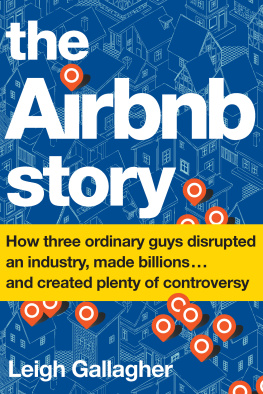
AIRBNB, SHORT-TERM RENTALS AND THE FUTURE OF HOUSING
How do Airbnb and short-term rentals affect housing and communities? Locating the origins and success of Airbnb in the conditions wrought by the 2008 financial crisis, the authors bring together a diverse body of literature and construct case studies of cities in the US, Australia and Germany to examine the struggles of local authorities to protect their housing and neighborhoods from the increasing professionalization and commercialization of Airbnb.
The book argues that the most disruptive impact of Airbnb and short-term rentals has been on housing and neighborhoods in urban centers where housing markets are stressed. Despite its claims, Airbnb has revealed itself as platform capitalism, incentivizing speculation in residential housing. At the heart of this trajectory is its business model and control over access to data. In a first narrative, the authors discuss how Airbnb has institutionalized short-term rentals, consequently removing long-term rentals, contributing to rising rents and changing neighborhood milieus as visitors replace long-term residents. In a second narrative the authors trace the transformation of short-term rentals into a multibillion-dollar hybrid real estate sector promoting a variety of flexible tenure models. While these models provide more options for owners and investors, they have the potential to undermine housing security and exacerbate housing inequality.
While the overall effects have been similar across countries and cities, depending on housing systems, local response has varied from less restrictive in Australia to increasingly restrictive in the United States and most restrictive in Germany. Although Airbnb has made some concessions, it has not given any city the data needed to efficiently enforce regulations, making for costly externalities. Written in a clear and direct style, this volume will appeal to students and scholars in Urban Studies, Urban Planning, Housing and Tourism Studies.
Lily M. Hoffman, Professor Emerita at CCNY and the CUNY Graduate Center, received her PhD in Sociology from Columbia University. Her research interests lie in the social/spatial impact of urban restructuring, including housing, tourism, urban governance and planning policy in comparative perspective. Among other publications, she is author of The Politics of Knowledge: Activist Movements in Medicine and Planning; co-editor of Cities and Visitors: Regulating People, Markets and City Space, with Susan S. Fainstein and Dennis R. Judd; and co-editor of Pandemics and Emerging Infectious Diseases: The Sociological Agenda with Robert Dingwall and Karen Staniland.
Barbara Schmitter Heisler is Professor Emerita, Gettysburg College. She received a PhD in Sociology from the University of Chicago and was the recipient of a German Marshall Fund Fellowship and the Berlin Prize. Her research, which has focused on international migration, racial and ethnic relations and housing, has been published in numerous journals and book chapters. Professor Heisler is co-editor of a special issue of the Annals of the American Academy of Political and Social Science and the author of two books, From German Prisoner of War to American Citizen and An Artist as Soldier.
First published 2021
by Routledge
2 Park Square, Milton Park, Abingdon, Oxon OX14 4RN
and by Routledge
52 Vanderbilt Avenue, New York, NY 10017
Routledge is an imprint of the Taylor & Francis Group, an informa business
2021 Lily M. Hoffman and Barbara Schmitter Heisler
The right of Lily M. Hoffman and Barbara Schmitter Heisler to be identified as authors of this work has been asserted by them in accordance with sections 77 and 78 of the Copyright, Designs and Patents Act 1988.
All rights reserved. No part of this book may be reprinted or reproduced or utilised in any form or by any electronic, mechanical, or other means, now known or hereafter invented, including photocopying and recording, or in any information storage or retrieval system, without permission in writing from the publishers.
Trademark notice: Product or corporate names may be trademarks or registered trademarks, and are used only for identification and explanation without intent to infringe.
British Library Cataloguing-in-Publication Data
A catalogue record for this book is available from the British Library
Library of Congress Cataloging-in-Publication Data
A catalog record for this book has been requested
ISBN: 978-0-367-23417-1 (hbk)
ISBN: 978-0-367-23418-8 (pbk)
ISBN: 978-0-429-27976-8 (ebk)
Typeset in Bembo
by Apex CoVantage, LLC
To Joel and Martin for homesharing
CONTENTS
PART ONE
The American experience
PART TWO
Moving beyond the US
Guide
When this project began in the summer of 2017, most studies of Airbnb and short-term rentals were within a tourism framework and only occasionally referred to housing issues or gentrification. At the International Sociological Association meetings in Toronto, July 2018, Lily Hoffman presented a paper on Airbnb, short-term rentals and the financialization of housing, placing the subject within the housing framework. At these meetings, she met with Routledge about the book project. Barbara Schmitter Heisler, a former collaborator, joined as co-author of the book.
It has been a tumultuous few years. Empirical studies of Airbnbs effects have begun to appear, cities have turned to regulating short-term rentals and a billion-dollar sector has emerged. All along Airbnb has been and is still a moving target.
At the time of this writing, the future of Airbnb is uncertain as the Covid-19 pandemic, which has brought travel to a halt, has also revealed underlying problems with the Airbnb business model for its hosts, its guests and for the platform itself. Some suggest that many STRs will return to the residential market and that Airbnb will transform again, finding new niches. Discussing plans for the crisis, CEO Brian Chesky wrote to his employees: Airbnb was born during a global crisis. It didnt stop us then, and it wont stop us now.
Whatever the future of Airbnb, short-term rentals have become an important part of the housing market and are here to stay.
April 2020
Within a short decade, the homesharing platform Airbnb grew from a small San Francisco start-up to a multibillion-dollar business and a recognized brand name. Offering travelers a more authentic experience in homes rather than hotel rooms and offering hosts a revenue stream to help pay the mortgage or rent, Airbnb has been widely recognized as a disruptor in the tourism and hospitality industry. In this book, we will argue that Airbnbs disruptive impact extends beyond the tourism industry and that by incentivizing the use of residential space for visitors, Airbnb and other homesharing platforms have disrupted local housing markets, most notably in large cities where urban tourism intersects with already stressed housing conditions.
While most of the academic literature and media reports have taken a tourism perspective, short-term rentals (STRs) straddle both the tourism and the residential housing markets. Given the critical importance of housing as a component of social and spatial inequality and the current climate of housing crises in most Western societies, we argue that it is important to position STRs within a housing perspective. Because housing is a basic human need for which demand is inelastic, even a small loss of supply can have a relatively large adverse effect. This is particularly the case in popular urban neighborhoods where tight housing markets already exist. By adding visitors to the mix, Airbnb has scrambled markets and populations which, for the most part, were compartmentalized, with visitors staying in commercial accommodations in commercially zoned districts. Now visitors compete for living space with local residents.











